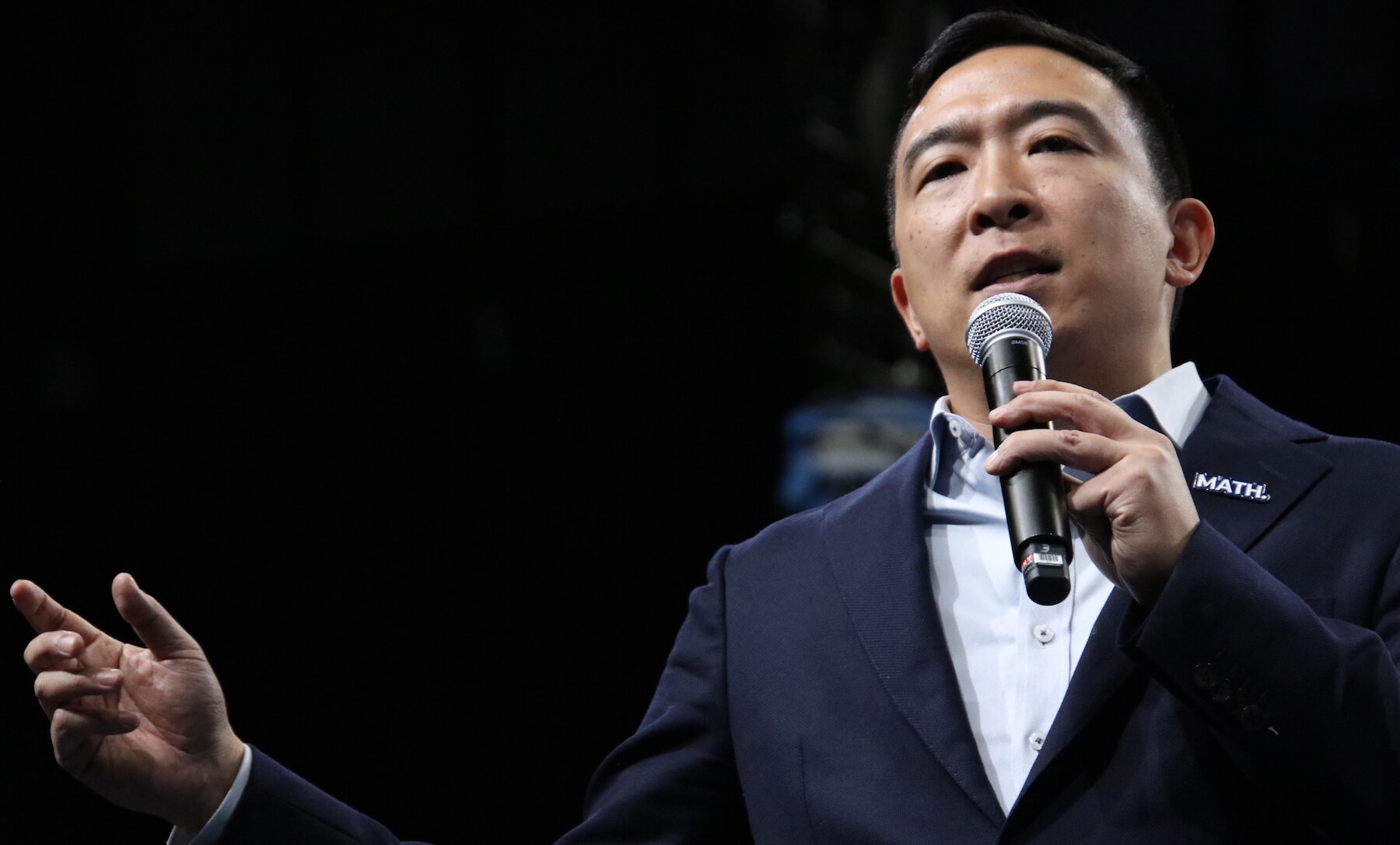
Photo by Julie Fleming
Everyone knows Andrew Yang as the guy who wants to take on artificial intelligence and automation. To that end, one of Yang’s signature promises is the Freedom Dividend, which would give $1,000 a month to all Americans.
But he’d also like to give people money to tackle a different kind of inequality.
“Lobbyists and corporate money were running our government even before Citizens United, and overturning Citizens United, which I’m for, would require a super-majority in Congress,” Yang told Starting Line this weekend. “And even if we did get it overturned, we still know lobbyists would be running around D.C.”
His solution is Democracy Dollars: $100 for Americans to donate to any candidate they want. The money would come from public funding and be distributed as vouchers. Yang’s vision is that when every American can donate to a candidate, the influence of big money groups can be diminished.
“For a number of months now, I’ve seen very clearly how the people are on one side and the money are on the other. And it’s very, very easy to start responding to the money, because you can count it. You can feel it,” he said. “So then you start responding to the money. The only solution is to unify the people and the money, so that if you’re a legislator and you do the people’s will, then you don’t need the lobbyist cash.”
[inline-ad id=”0″]
The idea is similar to the Democracy Voucher program in Seattle. There, voters apply to the program and get four $25 vouchers to fund candidates or their own campaigns. Candidates in Seattle must qualify for the program and then decide to participate in it.
There’s not much evidence it’s had the desired effect of eliminating dark money in Seattle. The Seattle Times has reported that there’s never been more influence from PACs than the 2019 city elections, though it’s not certain the Democracy Vouchers had anything to do with it — contribution caps to candidates may have done that.
And it has allowed more people to run and engaged more voters.
“It’s a way of people-powered public financing,” Yang said of his Democracy Dollars. “The hundred dollars per American voter would wash out all of the lobbyist cash by a factor of seven to one. So, there’s a way to unify legislators’ interests and incentives with us.”
When it comes to reform efforts, Yang’s ideas have been given an A-plus by Equal Citizens, an organization committed to reforms that fix democracy and establish equal citizenship. Other candidates with A-plus ratings are Elizabeth Warren and Tulsi Gabbard.
[inline-ad id=”1″]
Voters Respond To Yang Ideas
In Western Iowa, where Yang campaigned this weekend, voters mentioned Yang’s Democracy Dollars as a reason for their support.
Luke Speers, a 23-year-old in Sioux City, said Yang’s campaign finance ideas were part of what drew his attention to Yang.
“I know how he’s for helping people, helping working-class people,” he said. “I’m totally about that, actually.”
Speers said he’s most interested in Yang and Sen. Bernie Sanders as candidates, and his support for them is about 50/50. He said he’d be open to any of the candidates, though. Except for one.
“Biden is definitely the one that I’m not really about,” he said. Though Speers did say he’d vote for the nominee.
On the other hand, Micah Frederickson, said he was only really interested in Yang.
“I feel like his policies would really make a difference in a lot of people’s lives,” he said in Council Bluffs.
Frederickson said the other candidates seem like the same old politicians, who acknowledge the problems but don’t have workable solutions.
Frederickson, who is from Oklahoma, said he’s talked to Republican friends who like the idea of Yang’s Freedom Dividend.
“Money is power,” Frederickson said. “So he’s putting power in the hands of the people.”
[inline-ad id=”2″]
Supreme Court Reform
Yang also supports reforms like expanding the size of the Supreme Court to 15 or 17, and he backs an 18-year term limit for justices.
“I think term limits for Supreme Court justice would be the best place to start,” he said. “I agree that expanding the Supreme Court would also be a positive move, because if you had a higher number of justices, then each appointment wouldn’t be as much of a political firestorm.”
He also thinks the Supreme Court should reflect society, and he said he would appoint justices who do that with their backgrounds and the way they interpret the law.
“I think justices that see our laws as evolving to meet the needs of society are the kinds of justices I would appoint,” Yang said. “I agree that having different forms of legal experience to be very helpful. That’s the kind of change that would help make our judiciary more reflective of society.”
He has that view for other judgeships as well, at the appellate and district court level, though he doesn’t think those positions are as urgent as the Supreme Court.
All three levels of the federal court system have undergone a conservative shift under the Trump administration. As president, Trump has appointed more than 160 judges to benches across the country, and he’s poised to make more, with help from Republican leaders in the Senate.
Yang said he recognizes that as a problem, and he said he would confront it as president.
“Yeah of course, it’s going to be with us for many years,” he said. “And it’s something I would love to be able to counterbalance as president.”
by Nikoel Hytrek
Posted 11/25/19
Politics

Biden marks Earth Day by announcing $7 billion in solar grants
The Biden administration on Monday announced the recipients of its Solar For All Program, a $7 billion climate program that aims to lower energy...

6 terrifying things that could happen if the Comstock Act is used to target abortion
Does 1873 sound like a really, really long time ago? Well, that’s because it is—but if Republicans and far-right anti-abortion activists have their...
Local News

No more Kum & Go? New owner Maverik of Utah retiring famous brand
Will Kum & Go have come and gone by next year? One new report claims that's the plan by the store's new owners. The Iowa-based convenience store...

Here’s a recap of the biggest headlines Iowa celebs made In 2023
For these famous Iowans, 2023 was a year of controversy, career highlights, and full-circle moments. Here’s how 2023 went for the following Iowans:...





